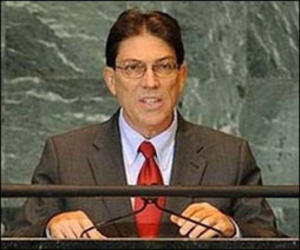For the US, a spectacularly embarrasing vote at the UN
- Submitted by: manso
- Editorial Articles
- 10 / 27 / 2010

La Alborada - October 27. After last year, it seemed that the annual vote at the UN could not get worse for the US. This year, it did just that: the vote was 187 against the blockade,two in favor. Palau, a Pacific micro-island that has supported the US in the past, decided to abstain, following the prior example of its neighbor Marshall Islands. Taking that stand is no small matter for an isolated nation in a commonwealth with the US.
The two votes in favor were the US itself and Israel. The latter had no choice but to go along, as it depends entirely on the US --militarily, economically, and diplomatically-- and is joined at the hip with the US in a common strategy to reshape the entire Middle East. Israel is now the only nation in the world that officially supports the US in the blockade against Cuba.
The vote yielded the most spectacularly embarrassing outcome against the US blockade since 1992, when, as a result of the Torricelli law, other nations decided that enough was enough, and began to vote increasingly against the blockade. After all, the Torricelli law was advertised as a sure-fire way to implode the Cuban economy, as was its successor Helms-Burton law of 1996 --but neither one succeeded, and the blockade made less sense with every passing year.
Why --asked the other nations-- should they be forced to obey a US law with which they disagreed and which ran counter to their own commercial and diplomatic interests?
Barack Obama presents himself as the president of multilateralism. It is true that the US has been effective in building coalitions of the so-called willing for specific purposes concerning the wars in the Middle East. In the case of Cuba, however, it is clearly, notoriously, and obstinately deaf to the opinion of the nations of the world. Now, only one other nation is willing.
Still, it persists in a failed policy enshrined in legislation. Still, it continues to demand that Cuba change itself radically at the direction of the US before it will consider whether to begin to dismantle different aspects of the
blockade.
Still, it depends on hunting down banks and corporations that can be strong-armed into compliance irrespective of their own national laws. After more than half a century, it continues to hope for an economic collapse in Cuba that will allow it to claim victory and save face: You see? We knew it would work!
But it hasn't worked, and the US hardly saved face at the UN this October.Probably, it will endure a replay next year.
Source: http://groups.yahoo.com/group/CubaNews/message/118658
Comments